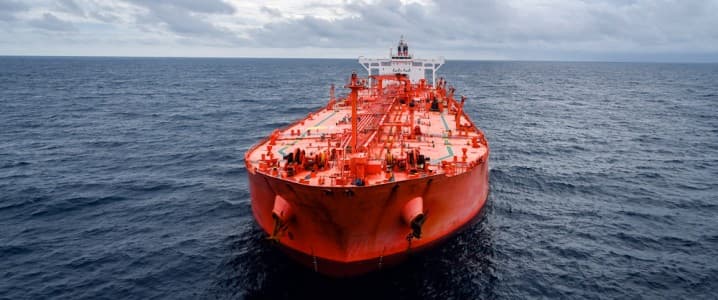Business
Russian Oil Tanker Reverses Course Amid U.S. Sanctions Threat

An Aframax tanker named the Furia has turned back after departing from the Russian coast, amid new threats of U.S. sanctions targeting Russian oil exports. The vessel, which loaded approximately 730,000 barrels of Urals crude from Rosneft at the port of Primorsk on October 20, 2023, is currently idling in the Baltic Sea. This unexpected reversal underscores the significant impact of U.S. sanctions on the Russian oil industry.
The crude oil aboard the Furia was intended for delivery to the Indian port of Sikka, used by companies such as Reliance Industries and Bharat Petroleum for importing foreign oil. Industry executives in India indicated that they anticipate a slowdown in new orders for Russian oil, particularly following the recent sanctions imposed on Rosneft and Lukoil, two of Russia’s largest oil exporters. These sanctions aim to curtail approximately 2 million barrels of oil exports per day, which constitutes about half of Russia’s total oil output.
According to data from energy analytics firms Kpler and Vortexa, the Furia’s estimated arrival at Sikka was projected for mid-November. With the sanctions now in effect, companies engaged in business with Rosneft and Lukoil have until November 21, 2023, to cease their operations. In response to the sanctions, Lukoil has announced plans to divest its overseas business.
The effectiveness of these sanctions has been met with skepticism among industry analysts. Kpler noted that while the sanctions may cause temporary disruptions in oil flows, they are unlikely to induce a fundamental change in the global oil market. The firm highlighted that transactions involving non-U.S. entities, including refiners in India, Turkey, and China, remain legally permissible, allowing them to purchase crude oil directly from Rosneft.
Richard Nephew, a former senior U.S. State Department official, remarked on the precarious balance the U.S. government seeks to maintain. He stated, “They are trying to thread a needle. They have clearly been given instructions not to blow up the global economy.” Nephew emphasized that the sanctions appear to be more of a signaling exercise than a decisive strategy, aimed at inflicting some level of economic damage without causing widespread disruption.
As the situation unfolds, the international oil market will be closely monitored for any shifts in supply and pricing dynamics. The potential for rising oil prices could have significant repercussions for large importers, particularly in Western nations, as they navigate the complexities of these sanctions.
-

 Education3 months ago
Education3 months agoBrandon University’s Failed $5 Million Project Sparks Oversight Review
-

 Science4 months ago
Science4 months agoMicrosoft Confirms U.S. Law Overrules Canadian Data Sovereignty
-

 Lifestyle3 months ago
Lifestyle3 months agoWinnipeg Celebrates Culinary Creativity During Le Burger Week 2025
-

 Health4 months ago
Health4 months agoMontreal’s Groupe Marcelle Leads Canadian Cosmetic Industry Growth
-

 Science4 months ago
Science4 months agoTech Innovator Amandipp Singh Transforms Hiring for Disabled
-

 Technology4 months ago
Technology4 months agoDragon Ball: Sparking! Zero Launching on Switch and Switch 2 This November
-

 Education4 months ago
Education4 months agoRed River College Launches New Programs to Address Industry Needs
-

 Technology4 months ago
Technology4 months agoGoogle Pixel 10 Pro Fold Specs Unveiled Ahead of Launch
-

 Business3 months ago
Business3 months agoRocket Lab Reports Strong Q2 2025 Revenue Growth and Future Plans
-

 Technology2 months ago
Technology2 months agoDiscord Faces Serious Security Breach Affecting Millions
-

 Education4 months ago
Education4 months agoAlberta Teachers’ Strike: Potential Impacts on Students and Families
-

 Education4 months ago
Education4 months agoNew SĆIȺNEW̱ SṮEȽIṮḴEȽ Elementary Opens in Langford for 2025/2026 Year
-

 Science4 months ago
Science4 months agoChina’s Wukong Spacesuit Sets New Standard for AI in Space
-

 Business4 months ago
Business4 months agoBNA Brewing to Open New Bowling Alley in Downtown Penticton
-

 Business4 months ago
Business4 months agoNew Estimates Reveal ChatGPT-5 Energy Use Could Soar
-

 Technology4 months ago
Technology4 months agoWorld of Warcraft Players Buzz Over 19-Quest Bee Challenge
-

 Business4 months ago
Business4 months agoDawson City Residents Rally Around Buy Canadian Movement
-

 Technology2 months ago
Technology2 months agoHuawei MatePad 12X Redefines Tablet Experience for Professionals
-

 Technology4 months ago
Technology4 months agoFuture Entertainment Launches DDoD with Gameplay Trailer Showcase
-

 Top Stories3 months ago
Top Stories3 months agoBlue Jays Shift José Berríos to Bullpen Ahead of Playoffs
-

 Technology4 months ago
Technology4 months agoGlobal Launch of Ragnarok M: Classic Set for September 3, 2025
-

 Technology4 months ago
Technology4 months agoInnovative 140W GaN Travel Adapter Combines Power and Convenience
-

 Science4 months ago
Science4 months agoXi Labs Innovates with New AI Operating System Set for 2025 Launch
-

 Technology4 months ago
Technology4 months agoNew IDR01 Smart Ring Offers Advanced Sports Tracking for $169










